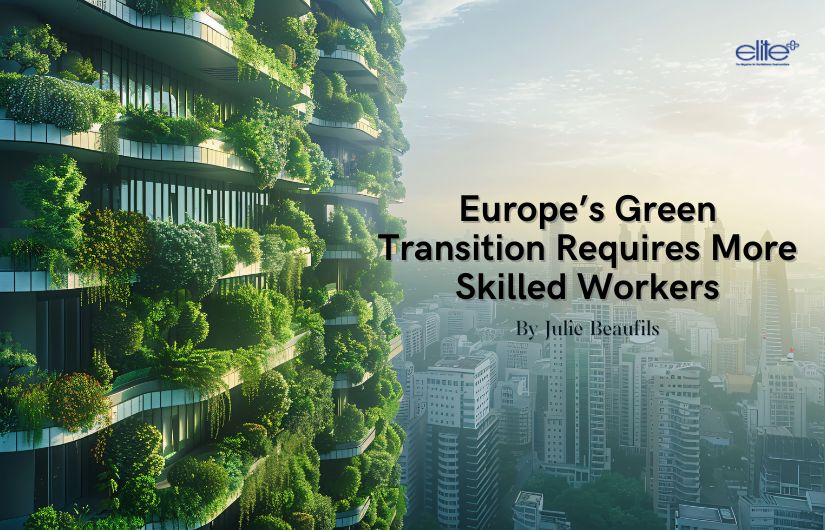Europe’s Green Transition Requires More Skilled Workers

By Julie Beaufils
BRUSSELS – Faced with the threat of climate change and growing technological competition from the United States and China, a growing number of politicians across the European Union are calling for reindustrialization to strengthen the clean-tech industry and enhance the bloc’s competitiveness. While these proposals may prove popular with European voters, they often overlook simple solutions to some of the EU’s fundamental challenges.
The European Green Deal, the recently approved Critical Raw Materials Act, and the Net-Zero Industry Act (NZIA) are the cornerstones of the EU’s response to Chinese and American industrial policies, particularly US President Joe Biden’s Inflation Reduction Act. While political and business leaders have advocated a “European Industrial Deal” to complement these measures and boost local manufacturing, this may not be enough to generate the necessary investments in clean technologies. Certain green sectors, such as solar power, continue to rely heavily on global supply chains, underscoring the EU’s vulnerability and lack of a coherent industrial strategy.
Nevertheless, there are grounds for cautious optimism. The EU’s clean-energy transition has gained momentum over the past four years, with renewables overtaking fossil fuels as the bloc’s primary power source. Meanwhile, investments in electric vehicles, battery gigafactories, and wind power have surged.
Workers have a central role to play in the EU’s green transition. But as far-right parties rise to power across the bloc, populist leaders increasingly use ongoing labor shortages as a pretext to postpone action. Consequently, European policymakers find themselves at a crossroads. To facilitate the clean-energy transition, which is expected to create hundreds of thousands of high-quality jobs, they must first address the current shortage of skilled workers.
The electrical contracting sector is a prime example. Europe is currently home to over 1.8 million electrical professionals, with near-zero unemployment in the industry. But to meet its ambitious clean-energy targets, the EU desperately needs more skilled workers. According to EuropeOn, the European association of electrical contractors, Germany needs over 90,000.
To unlock the green transition’s full potential and enable clean-tech companies to expand, European countries must close the green skills gap. But this effort may require a broader societal shift, given that the current electrician shortage reflects Western societies’ preference for cognitive abilities over practical skills. As British journalist David Goodhart argues in his 2020 book Head, Hand, Heart: The Struggle for Dignity and Status in the 21st Century, today’s service-oriented economy, with its emphasis on academic qualifications, has led to the undervaluation of technical education.
Fortunately, the NZIA could significantly enhance the appeal of technical careers. To foster cooperation between EU member states and the European Commission, the Act establishes a “Net-Zero Europe Platform.” Tasked with identifying shortages and monitoring labor-market needs, this mechanism could enable policymakers to direct EU funding toward targeted media campaigns tailored to specific national contexts provided there is political will to endow the platform with the power to act decisively. To the extent that such initiatives change public perceptions of technical vocations, they can play a pivotal role in cultivating a skilled workforce and accelerating the EU’s energy transition.
But there are no quick fixes to the acute shortage of skilled professionals across the European economy. Training electricians, for example, typically takes three years. While policymakers and manufacturers might be tempted to pursue short-term training programs to mitigate immediate labor shortages, such schemes often are mere stopgaps.
One promising long-term solution is to expand access to apprenticeships. By allocating more resources to placing prospective employees within small and medium-size enterprises, European countries can train the qualified technicians they need to develop their clean-tech industries. Yet, despite its clear social and economic benefits, this approach remains underdeveloped, owing to limited support from national policymakers.
As governments around the world develop their own green industrial policies, Europe must not squander the opportunity to establish itself as a global clean-tech leader. While the NZIA represents a promising first step, much more is needed. By embracing apprenticeships and fostering a culture of continuous learning, the EU could unleash a wave of innovation, driven by highly skilled workers, thereby ushering in an era of economic prosperity and paving the way to a more sustainable future.
Julie Beaufils is Secretary General of EuropeOn, the European Electrical Contractors Association.

Copyright: Project Syndicate, 2023.
www.project-syndicate.org













































































































































































































































































































































































































































































































































































































































































































































































































